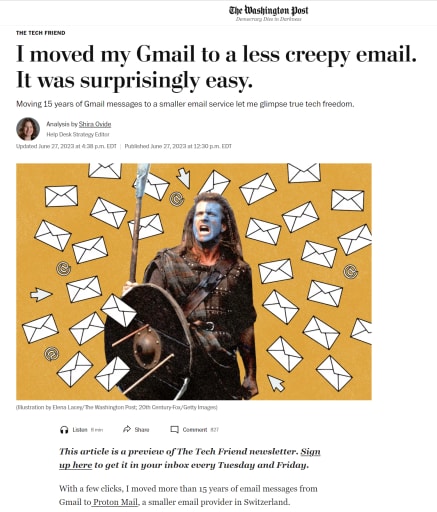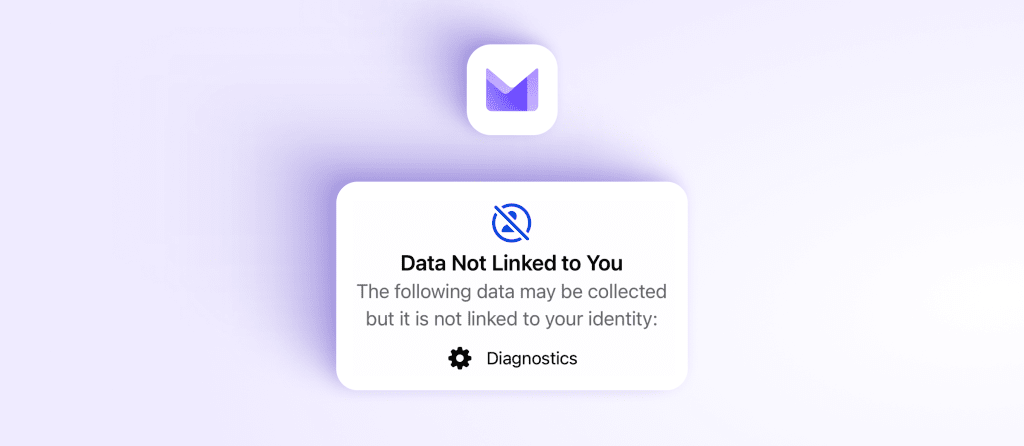Avec plus de 4 milliards d’utilisateurs actifs(nouvelle fenêtre) et environ 350 millions de messages envoyés quotidiennement, l’e-mail est l’outil de communication le plus réussi jamais inventé. Pourtant, il y a probablement 15 ou 20 ans que l’e-mail n’est plus principalement axé sur la communication.
Aujourd’hui, l’e-mail est l’identité. Votre adresse e-mail est le fil commun qui relie tous les différents services que vous utilisez en ligne et sert de nom d’utilisateur ou d’identifiant unique indiquant qui vous êtes sur l’ensemble d’Internet. Vous la communiquez chaque fois que vous vous inscrivez à un nouveau service en ligne et hors ligne. De ce point de vue, votre e-mail est comme votre passeport dans le monde physique, mais en réalité, bien plus important qu’un passeport. Perdre votre passeport peut être un inconvénient majeur, mais perdre votre compte e-mail peut entraîner des pertes irrécupérables.
Étant donné cette importance, celui qui contrôle votre identité numérique contrôle votre présent et votre avenir – c’est là que se joue la véritable bataille pour l’avenir d’Internet. Beaucoup ont supposé qu’en lançant Proton Mail en 2014, notre objectif était de fournir un moyen de communication sécurisé, mais la véritable bataille que nous avons toujours menée concerne l’identité numérique. Dans cette lutte, l’e-mail est bien plus important que la plupart des gens ne le réalisent.
Que représente Gmail pour Google ?
La manière la plus simple de comprendre pourquoi remporter la bataille de l’e-mail est essentiel pour gagner l’avenir d’Internet est de comprendre pourquoi l’e-mail est important pour Google, l’entreprise Internet la plus dominante au monde.
Le modèle économique de Google repose entièrement sur la collecte du maximum de données personnelles vous concernant pour la publicité basée sur la surveillance(nouvelle fenêtre).

La pierre angulaire de cela est Gmail parce que Gmail vous maintient connecté à Google, permettant à Google de relier toute votre activité sur toutes les propriétés de Google. De Gmail à Google Search, YouTube, Google Maps, Google Photos, Chrome, etc., Google collecte des masses de données personnelles(nouvelle fenêtre) lorsque vous utilisez ses services, suivant chaque déplacement que vous faites en ligne. Cela inclut les secrets les plus sensibles et intimes que vous ne confieriez peut-être pas à votre ami le plus proche ou à votre famille. Votre e-mail relie tout cela à votre identité réelle.
Sur la base des données collectées, Google construit des profils de caractère(nouvelle fenêtre) sur vous pour vendre l’accès aux entreprises qui font de la publicité. Plus ils en savent sur vous, mieux ils peuvent affiner leurs profils secrets à votre sujet.
De plus, les gouvernements et les forces de l’ordre peuvent accéder à ce profil et à ces données(nouvelle fenêtre) s’ils se présentent avec les documents juridiques appropriés.
Que donne à Google la possession de votre identité ?
Voici la liste des données que Google collecte via l’application Gmail :

Mais être connecté à votre compte Google (synonyme de Gmail) donne à Google bien plus encore. Si vous avez un téléphone Android, Google peut vous observer 24h/24 et 7j/7 car il possède le système d’exploitation, surveillant tout, de l’utilisation de vos applications à vos messages texte en passant par vos photos. Google peut également suivre vos déplacements dans le monde réel, même si vous désactivez les services de localisation(nouvelle fenêtre).
Le plus inquiétant, c’est que l’espionnage du géant de la tech va bien au-delà de ses propres services. Comme les autres géants de la tech, Google peut vous suivre sur le web en liant votre adresse e-mail à votre adresse IP(nouvelle fenêtre), empreintes de navigateur et d’appareil, cookies tiers(nouvelle fenêtre) et autres traqueurs. Mais la portée de Google s’étend encore plus loin.
Lorsque vous créez un compte, ce service vous envoie généralement un e-mail pour confirmer que l’adresse e-mail est valide. Si vous vous inscrivez à un service en utilisant votre adresse Gmail, ces e-mails de confirmation donnent à Google un registre exhaustif de tous les services auxquels vous vous êtes inscrit.
Si vous utilisez les boutons omniprésents « S’inscrire avec Google » pour vous connecter à un service, vous pourriez potentiellement exposer encore plus vos données(nouvelle fenêtre) et faciliter encore plus le suivi de vos comptes externes par Google. Vous pouvez voir combien d’applications tierces partagent des informations avec Google en vous connectant à votre compte Google et en consultant son centre de permission(nouvelle fenêtre).
Parmi les 75 000 sites les plus visités sur internet, 72 % utilisent Google Analytics(nouvelle fenêtre), ce qui permet à Google de collecter toutes sortes d’informations sur les utilisateurs visitant ces sites. Et des millions de sites internet qui diffusent des publicités Google collectent des informations sur quiconque sur leur site via la balise globale du site et de nombreux autres traqueurs Google(nouvelle fenêtre).
En conséquence, Google peut vous suivre sur internet, enregistrant vos données personnelles sur la grande majorité des sites que vous visitez, le tout relié à votre identité réelle via Gmail.
Refusez et reprenez le contrôle de votre identité

Passer de Gmail à Proton Mail vous offre bien plus qu’une communication privée sans publicités. Cela vous permet de déplacer votre identité loin de Google.
Si vous n’êtes pas connecté à Gmail, Google ne peut plus relier votre activité sur l’ensemble d’internet à votre identité réelle, rendant plus difficile pour Google de vous profiler.
Même si vous ne pouvez pas éviter Google Search, YouTube, Google Maps, etc., ne pas se connecter à un compte Gmail signifie que Google ne peut pas relier votre activité à votre identité car vous l’avez séparée de leur machine de surveillance.
Étant donné que vous pouvez maintenant passer de Gmail à Proton Mail(nouvelle fenêtre) d’un simple clic via Easy Switch grâce au RGPD.

Il est maintenant plus facile que jamais de vous libérer de Google (et de bénéficier également de notre Proton Calendar chiffré de bout en bout, Proton Drive, Proton Pass, et plus encore).
Les services Proton sont fondamentalement différents. Notre chiffrement zéro accès signifie que nous ne pouvons pas accéder à aucune de vos données ou construire un profil sur vous, même si nous le voulions. La politique de confidentialité de Proton est également totalement différente, construite autour du modèle de collecte de données minimales.

C’est possible parce que notre modèle économique est fondamentalement différent. Bien que nos services soient également disponibles gratuitement, notre entreprise est soutenue par des entreprises et des particuliers qui nous paient, et non par des entreprises qui font de la publicité (Proton n’a pas de publicités et pas de revenus publicitaires).
En somme, Proton représente une vision différente de l’avenir d’internet, où vous contrôlez votre identité, par opposition à une vision où vos données sont une marchandise à exploiter pour le profit. L’e-mail est bien plus que de la communication, c’est votre identité, et cela mérite d’être protégé.
